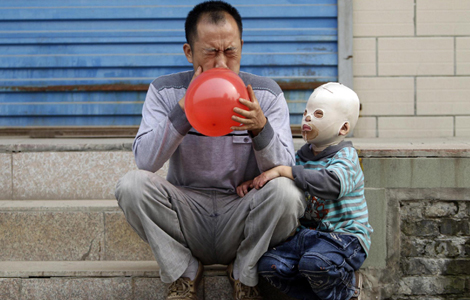US safer 10 years after 9/11, but at what cost?
Updated: 2011-09-07 13:53
(Agencies)
|
|||||||||||
NEW YORK - Tourists flock to Times Square for the bright lights and Broadway shows. There they find another spectacle: helmeted police with machine guns patrolling the subway station on the lookout for would-be bombers and gunmen.
 |
|
Visitors are seen at the 9/11 Memorial Preview Site in New York, Sept 5, 2011. [Photo/Agencies] |
Ten years after the September 11 attacks of 2001, the United States has altered the balance between freedom and security, turning an open and casual society into an ever-vigilant one.
The results are undeniable. The country has not suffered another attack, though there have been close calls like last year's failed Times Square bombing, when the makeshift explosives packed into a Pakistani-American's truck failed to detonate.
But at what cost in lost liberty and dollars? Civil libertarians fear the era of surveillance and circumspection could become permanent.
The United States has spent an additional $400 billion on security plus $1.3 trillion on the wars in Iraq and Afghanistan before counting interest on the war debt and healthcare for veterans, according to the "Costs of War" research project by Brown University's Watson Institute for International Studies.
The president and police have more power, claiming more authority to snoop into the private lives of citizens with less oversight from the courts. Airport security are much more thorough.
Soon after September 11, the US government resorted to two controversial practices in response to threats from abroad - extraordinary rendition - the illegal transfer of foreign suspects captured abroad to a third country for detention and interrogation - and imprisonment of suspected militants captured abroad at the US military base at Guantanamo Bay, Cuba.
"Ten years later, if we are still in this emergency mindset, then this is now who we are. This is the new normal," said Susan Herman, president of the American Civil Liberties Union. "At some point if you don't reverse that process you really have moved yourself into an Orwellian state."
For many who remember the mass loss of life on that crisp, clear Tuesday morning 10 years ago, the "new normal" has served the country well.
"To me there's no doubt it's been worth it," said US congressman Peter King, a New York Republican who is chairman of the House of Representatives Committee on Homeland Security.
"Actions like the Patriot Act, inspections at the airports, port security - all of that is certainly better than people being burned to death or having to throw themselves out of 106-story buildings," King said. The Patriot Act, passed in October 2001, expanded the surveillance powers of US law enforcement agencies.
Growth for security industry
The reaction to September 11 also created a robust security industry that has benefited companies such as OSI Systems Inc, whose Rapiscan unit makes airport screening machines. OSI's annual revenue grew from $111 million to a high of $623 million in 2008. Analysts project revenues in the $700 million range for 2012.
Other companies including L-3 Communications Holdings, Verint Systems Inc, FLIR Systems Inc and American Science and Engineering Inc saw dramatic growth but must adapt to tighter US Department of Homeland Security spending because of Washington's budget crunch.
"There is no growth in US government spending. The big growth for homeland security is going to be international, primarily in the Middle East," said Brian Ruttenber, an equity analyst at Morgan Keegan.
The business is feeling public opposition to intrusive scans at airports and sees more growth potential in machines that inspect cargo containers and tractor trailers.
"You don't have tons of controversy around containers," Ruttenber said.
The airport inspections are tolerated. "If I have the choice between taking off my shoes and having the risk of the plane blowing up, I'd rather take off my shoes," King said.
The invasion of privacy is more unsettling, especially for Muslims and people of Middle Eastern descent who face discrimination and have been caught up in the security net.
"It's worse now than it was on September 11, 2002," said Dawud Walid, head of the Michigan branch of the Council on American-Islamic Relations. "I don't see things being dramatically different five to seven years from now."
One prominent civil libertarian blames President Barack Obama for expanding the growth of executive power. Jonathan Turley, a professor at George Washington University's law school, called Obama a "nightmare" who betrayed civil libertarians after campaigning against Bush's approach.
"It's very easy to give up civil liberties but it's very difficult to regain them," Turley said. "For civil libertarians, Barack Obama has proven to be a nightmare. He has made all the arguments previously made by Bush and has gone further in some cases. He has shown very little concern for civil liberties in the area of counterterrorism."
King sees those concerns as misplaced and expressed confidence in the courts to protect innocent people who will inevitably be ensnared by police mistakes.
"I don't see any extremes at all," King said. "My concern is that people in government don't take it seriously enough and try to be politically correct."
Related Stories
Retired dog of 9/11 keen on search cause 2011-09-07 13:21
Memorial museum opens on 10th anniversary of 9/11 2011-09-07 11:28
Navy ship to be in NY to mark 9/11 anniversary 2011-09-07 10:18
US safer but not safe enough after 9/11 2011-09-06 11:11
Obama lays wreath for 9/11 victims 2011-09-06 11:48
- Egyptians break into Israeli Embassy in Cairo
- World took a stand after 9/11: Locke
- 11 dead in C China ferry sinking
- Birth defects still a challenge
- Ministry: China to further facilitate investment
- State Council demands spill probe
- Little role of NATO in anti-terrorism
- Internet major source of rumors: poll
Hot Topics
Libya conflict, Gaddafi, Oil spill, Palace Museum scandal, Inflation, Japan's new PM, Trapped miners, Mooncake tax, Weekly photos, Hurricane Irene
Editor's Picks

|

|

|

|

|

|







